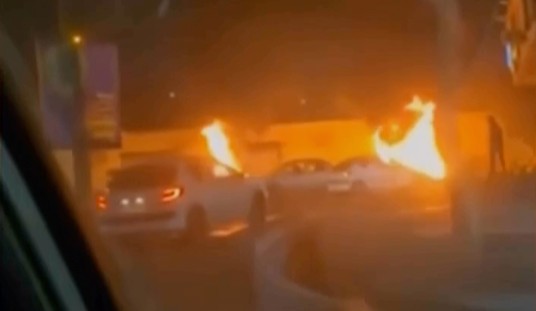Celebrating a car bomb is not the politically correct thing to do.
Yet there is something deeply satisfying about the assassination of Islamofascist terror master Imad Mughniyeh before the stroke of midnight the other day in the central command post of Islamofascist movements inside Damascus, Syria.
Whoever planned it scored a blow so hard, so disturbing, that it brought the secret services of Iran, Syria, Hamas, and Lebanon’s Shiite Hezbollah all together into Syria’s capital where they are now trying to figure out what happened.
In a chaotic eulogy, the man’s boss, Hezbollah’s chief Sheikh Hassan Nasrallah, practically promised war on Israel — the presumed doer — America, and the West. Following nearly 24 hours of silence, the Syrian official media acknowledged the bomb in its bosom, decrying it as a “flagrant violation of international law” — the first time such concern for civility has been demonstrated by a regime steeped in murder.
Iran, the undisputed godfather to Hezbollah and hostage-taking, dispatched its foreign minister and its Revolutionary Guards Corps commander of the Quds force to commiserate. In Beirut two rallies of a hundred thousand each took place simultaneously the day after, one marking the three-year anniversary of the murder of Prime Minister Hariri, presumably by Syria, and another with uniformed Hezbollah mourners marching behind Mughniyeh’s coffin, led by his mother screaming, “Look what they did to my boy.” (Never mind the same Mrs. Mughniyeh lost two more boys, Jihad and Fouad, in 1984 and 1985, to car bombings of their own that went bad.)
Is this much ado about one terrorist? Not this case and not this one. Sometimes a single bullet or mini-bomb blazes a path to clarity. This upset shook a Syrian edifice of invulnerable macho terror, showing a way to widen a breach.
In short order the man in charge of Hezbollah’s special operations for nearly three decades — a man wanted in 42 countries; a killer of hundreds of Americans, including Marines, CIA folks, and diplomats; a man whose reach wrecked a Jewish cultural center in Buenos Aires as well as an American oil workers’ housing complex in Saudi Arabia; a multinational terrorist born in Lebanon, who resides in Tehran and travels under deepest Syrian cover — was blown away as he stepped out of an intelligence meeting in a plush Damascus residential neighborhood of his mentor state. And no one left a note.
The Islamofascist association is right to be upset. This is the sort of thing that can spread. For years car bombs made in Damascus have blown up Lebanese nationalists, starting in 2005 with a spectacular murder of a prime minister and 22 others. He was followed to the grave by scores of other Lebanese victims, parliamentarians, journalists, civil servants, and army generals at regular intervals, plus a three-month war with Fattah al-Islam, a Syrian-trained Islamofascist Palestinian group sent to wage war in Lebanon’s refugee camps last year.
For President Bashar Assad, the Damascus call last week was the first time he got return postage. Now new vistas open along with — macabre as it is — a new path, namely that bombings are a game good guys can play too, and very close to where President Assad lives and plans his.
It had all seemed to be too much one-way traffic in these past years anyway. Even Arabs were pining for a slap back, by Israel or some Lebanese. A verity reported not often enough is that Syria, Hezbollah, and Hamas all grate badly the Arab underbelly and have for some time.
In the summer of 2006 the Arabs were all cheering on the Israeli army in its botched war on Hezbollah. Similarly in Gaza, Arabs look at the Israeli army retaliation against Hamas and its economic squeeze of Gaza favorably. A similar situation exists today over Syria, with many hoping someone (Israel again?) will take it down. Hence the suppressed Arab cheers for that Damascus bombing — whoever planted it.
Arab pundits never shy away from noting that for all its talk of militancy about Israel, and its proxy wars waged via Palestinians or Hezbollah, Syria has never fired a shot “in anger” to liberate its own Golan Heights, taken by Israel way back in 1967.
Syrian bravado notwithstanding, Damascus’ terror mask melted a bit the other day with the knowledge there is a lot more where this came from. Syrian calling stations are plentiful at home, in the Persian Gulf region, in Europe, and in Beirut, where the same sender can deposit new calling cards.
We may not know who did the deed, but it was so well done we know it can be done again. So why not sit back and watch Bashar Assad’s best men taken out for another dance?
Youssef M. Ibrahim, a former Middle East correspondent for the New York Times and Energy Editor of the Wall Street Journal is a freelance writer and Mideast political risk consultant based in New York.









Join the conversation as a VIP Member